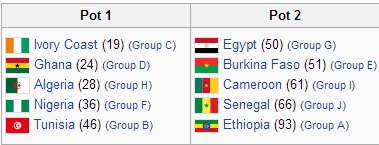
52 nations started out on the road to qualification in November 2011. The lowest ranked 24 countries were drawn to play on a home and away basis with the winning 12 joining the higher ranked 28 in 10 groups of 4 teams. The winners of those 10 groups were drawn on a home and away basis with the five winners taking the planes to Brazil. The draw for the initial two-legged play-off was seeded based on FIFA rankings. The draw for the groups was also seeded and the draw for the final play-offs were also seeded based on FIFA rankings. FIFA rankings are very important and tend to favour the more successful nations heavily.

If a sports body is to use seeding then how it implements it has (by definition) a critical impact on the likely outcome of the games and tournament. So what system balances the needs of the sports body for big games and the need to ensure tournaments are decided on merit. I'd argue that the seedings should be based on the most up-to-date information about teams or participants and this would mean, where possible, seeding based on performance within the tournament.
However, it has to be remembered that FIFA rankings are based on performances over 4 years. So a team like Ethiopia that emerges to challenge the big guns of African football will find it harder to break through due to the use of seeding based on performances several years ago (which are heavily weighted in favour of those teams that qualified for the last World Cup finals). Based on the results from last weekend's play-offs, it is likely that Africa will have the same five representatives in Brazil 2014 as they had in Germany in 2010 (Cameron, Nigeria, Cote D'Ivoire, Algeria and Ghana).
At the start of a tournament, for example a World Cup qualifying campaign, it is reasonable for the organisers to use performance in previous tournaments to seed players or teams. This is used in tennis, football, rugby and many other sports. However, once a tournament is under way the organisers have more up-to-date information on which to base seeding in later rounds. Perhaps football could learn from other sports. For example in the Heineken Cup the quarter final draw is not based on historical rankings (which are used to allocate teams in the group stages) but rather the teams' performances in the group stages determine the seeding of the quarter final draw. The team with the best points total in the groups is drawn against the qualifying team with the worst performance. And 2nd, 3rd and 4th are drawn against 7th, 6th and 5th respectively. This creates an incentive for every game because even teams that have won their group will want to continue winning to ensure they get as good a draw (and a home quarter final) in the next round.
Other examples include athletics and swimming where lane allocation (an important influence on the race outcome) is based on finishing times in the heats, rather than whether a particular sprinter or swimmer is the gold medallist from the last Olympics. These have the added benefit of ensuring every heat is a meaningful race in itself.
If the African Football Federation (CAF) had used the same system as the Heineken Cup for example the play-off draw would have pitted Ethiopia (7th best finishers - though they would have been 2nd best without the points deduction) against Cote D'Ivoire. Interestingly, Nigeria would have been ranked 9th and would have faced Ghana (who demolished Egypt 6-1 this week) while African Nations Cup runners up Burkina Faso would have been the worst placed team and played Egypt. It would also have meant that top ranked teams in the group would not just be targeting a top place within their group but also fighting for every point and extra goal difference right down to the final match to ensure a better draw in the final round.
Ethiopia were unlucky to lose to a last minute penalty in Addis Ababa last weekend and so next month will have a tough task in the return leg in Calabar. But it seems for the developing football nations in Africa this is par for the course,

 RSS Feed
RSS Feed